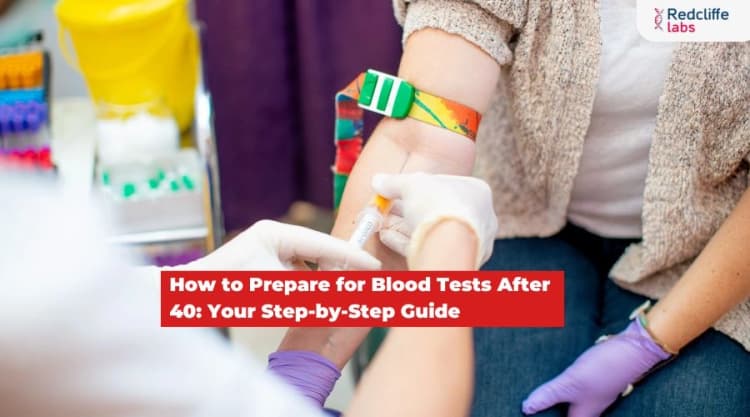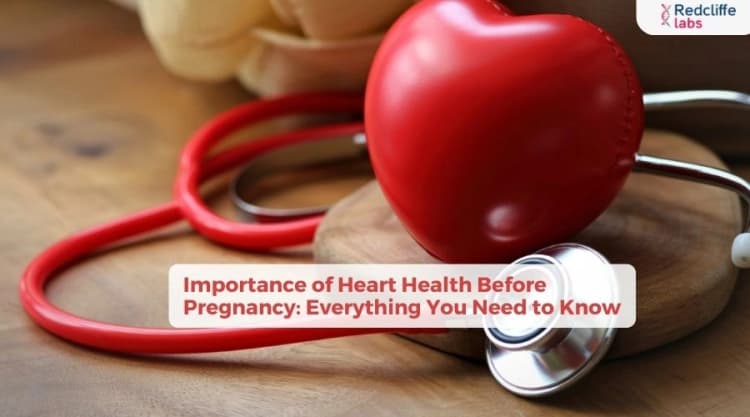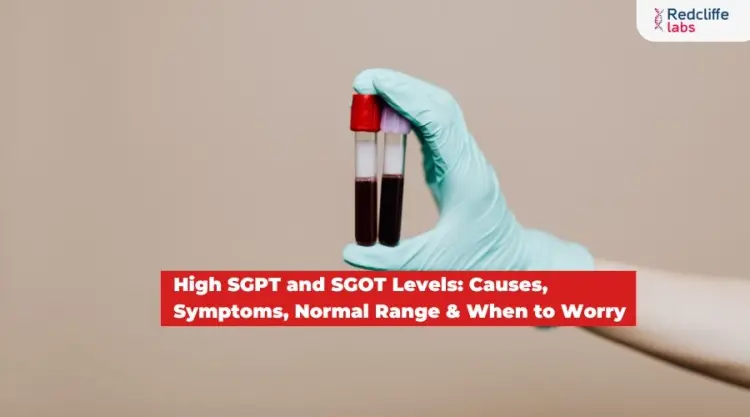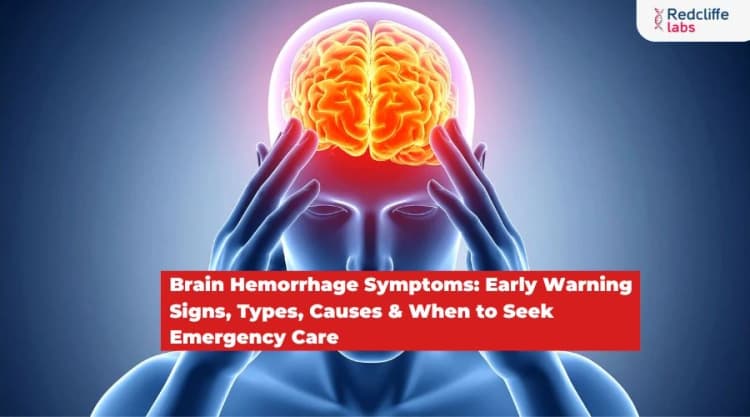This profile is designed to evaluate the primary indicators of cardiovascular health. T...Read more
Blood
Unlock special
discount on
this package
Login to Unlock 🔓
Get Complete Health Insights with Your Report

Health Score
Your overall wellness, simplified into one score.
Health Trends
Visualize your health progress over time
Personalized Improvement Plan
Get expert-backed steps to improve your health
NABL Accredited lab*




Booking Benefits Unlocked Worth FREE 799

Report Consultation

Diet Plan
*Available once your report is generated.
At Redcliffe Labs, we have a single goal: to give India its right to quality diagnostics.
Customers served
Tests Processed Everyday
Cities
Collection Centres
World Class In-house Labs
Home Collection Experts
5 Test Parameters
Apolipoprotein A1 (Apo A)
1 PARAMETER INCLUDED
1 PARAMETER INCLUDED
Apolipoprotein B/A1 Ratio
1 PARAMETER INCLUDED
1 PARAMETER INCLUDED
Apolipoprotein B (Apo B)
1 PARAMETER INCLUDED
1 PARAMETER INCLUDED
High Sensitivity C-Reactive Protein (Hs-CRP)
1 PARAMETER INCLUDED
1 PARAMETER INCLUDED
Lipoprotein (a)
1 PARAMETER INCLUDED
1 PARAMETER INCLUDED
Helps you know your test better
Who all are eligible for the essential cardiac risk markers package?
- Any individual showing the symptoms of chest pain, pressure, shortness of breath, irregular heartbeats like arrhythmia, and other abnormalities should go for a cardiac risk marker essential package.
Why take the essential cardiac risk markers package ?
- You should get the essential cardiac risk markers package because it helps estimate the cardiac risk markers in the body so that a comprehensive evaluation of the heart can be performed. Also, the test can assist in evaluating abnormal levels for better treatment effectiveness.
What are the benefits of an essential cardiac risk markers package?
- This package comprises 5 tests such as HsCRP, Lipoprotein (a), Apolipoprotein A1 (Apo A), Apolipoprotein B (Apo B), and the Apolipoprotein B/A1 Ratio to give you detailed and accurate insights into your health so that treatment can be planned accordingly at the initial stages before your health condition becomes worse.
Top Booked Health Checkup Packages
Reports in 12 hours
|Parameters 94
Reports in 12 hours
|Parameters 96
Reports in 12 hours
|Parameters 89
Reports in 12 hours
|Parameters 96
Reports in 12 hours
|Parameters 90
Helps you know your test better
Q. What Is a Cardiac Risk Marker Test?
Q. What Is Included In Cardiac Risk Markers- Essential?
Q. Are Any Special Preparations Required?
Q. Does This Test Pose Any Risks?
Verified by Medical Expert

MEDICALLY REVIEWED BY
Dr. Gurpreet Kau...

WRITTEN BY
Kirti Saxena
Table of Content
Introduction to Cardiac Risk Markers- Essential
A cardiac risk markers test includes blood tests performed to assess potential heart risks related to heart disease. The main motive behind suggesting these tests is to help your healthcare provider learn how close your heart is to causing problems such as heart attack or stroke. Getting tested makes it easier for you to make informed choices about your heart health and prevent serious complications in the future.
Your blood says it all. Your healthcare provider can suggest a wide range of tests to detect valuable biomarkers that appear in the blood. These include apolipoprotein A, apolipoprotein B, homocysteine, a high-sensitivity C-reactive protein (hs-CRP), and lipoprotein A.
Additionally, these specific biomarkers provide a lead to your doctor and prove supportive to be utilized for a more comprehensive assessment of cardiac risk factors. Early detection and timely intervention help the expert provide tailored preventive measures and treatments.
Let’s examine the cardiac risk markers test list, which indicates health. Symptoms such as a family history of cardiovascular disease (CVD), diabetes, chest pain, or pressure suggest cardiac risk marker test that goes beyond the standard lipid profile.
8 Specific Cardiovascular Risk Markers in Detail
A cardiac risk markers test list includes the following:
1. Lipid Profile: A lipid profile is prescribed to measure your blood's fats (lipids). Measuring lipids helps assess your risk for heart disease and stroke. A lipid profile typically measures total cholesterol, low-density lipoprotein (LDL), high-density lipoprotein (HDL), and triglycerides.
- Total cholesterol measures the overall amount of cholesterol in the body. High levels indicate increased plaque buildup in the arteries, resulting in atherosclerosis and heart disease.
- LDL is the bad cholesterol that carries cholesterol to the arteries. High LDL can lead to plaque buildup, narrowing the arteries.
- HDL is a good cholesterol that helps remove extra cholesterol from the blood. Low HDL levels indicate an increased risk of heart disease.
- Triglycerides: This type of fat is formed from excess calories, alcohol, and sugar consumption. Elevated levels can contribute to heart disease.
2. Apolipoprotein A (Apo A): It is a protein that helps good cholesterol or high-density lipoprotein (HDL) remove bad cholesterol or low-density lipoprotein (LDL) from your body. Elevated levels of apolipoprotein A may indicate a reduced risk of heart disease.
3. Apolipoprotein B (Apo B): This protein type is mainly connected with low-density protein (LDL). Elevated levels of apolipoprotein B may indicate you are at a greater risk for developing a heart ailment.
4. Homocysteine is an amino acid, and its high levels can damage your arteries from the inside and put you at a greater risk of forming blood clots.
5. A high-sensitivity C-reactive protein (hs-CRP) detects inflammation in the body. The test can be utilized to confirm heart disease and stroke when you don’t already have heart disease.
6. Lipoprotein A: Research reveals that elevated levels of lipoprotein A are linked to a higher risk for CVD and other ranges of conditions like irregular heart rhythms (arrhythmia), heart valve disease, and poor circulation.
7. Fibrinogen test: This test helps measure the levels of fibrinogen, a protein in the blood that aids in the formation of clots.
8. Troponin & Creatine Kinase-MB (CK-MB) (Only needed in suspected heart attack cases): Compared to Creatine Kinase-MB (CK-MB), cardiac troponin is more sensitive and more specific. It is used more often today.
If your healthcare provider has suggested a cardiac risk markers test depending on existing symptoms, do not delay. Get yourself tested with Redcliffe Labs at INR 1199 only. Additionally, if you find it challenging to visit a diagnostic center nearby, you can book a blood test online with home sample collection. Through this significant advance, our diagnostic lab helps prevent delays in health checks and eases the challenge of juggling work and health.
Step-by-step information on booking a test online from Redcliffe Labs.
- Visit the official Redcliffe Labs website: https://redcliffelabs.com/.
- Browse or search for the specific test you need.
- Add the test to the cart.
- Complete the payment process online.
Note: You will receive confirmation through SMS and WhatsApp.
Test Details
| Also known as | High-sensitivity CRP (hs-CRP) tests, cardiac biomarkers test, cardiac risk panel, cardiac risk markers profile |
| Purpose | It monitors heart functioning & helps diagnose cardiac abnormalities (if any). |
| Preparation | Do not drink or smoke before the test. |
| Fasting | No fasting required |
| Get reports within | 24 hours |
| Actual Cost | INR 2459 |
| Cost Offered | INR 1199 |
| Home Sample Collection | Available |
What is the purpose of a cardiac risk markers test?
Cardiac risk markers profile test helps evaluate the functioning of your heart by estimating the levels of cardiac risk markers. A healthcare professional may also suggest detecting abnormal bodily lipids, resulting in heart attacks or other severe heart conditions.
Below are the reasons behind getting a test a cardiac risk markers test done:
- Helps identify higher risk for heart-related issues: One primary purpose of an advanced cardiac risk factors test is to help a doctor determine whether you are at a higher risk of developing heart-related issues due to bad eating habits, smoking, and drinking even before the symptoms appear.
- Assessing heart function and overall health: Second, doctors suggest the test to help assess the heart's functioning. For instance, abnormal lipids in the body indicate heart attacks, heart blockage, or other cardiovascular complications.
- Determines an individual’s risk of heart conditions: if you have a family history of a heart-related ailment, other factors like obesity, prior heart attack, stroke, diabetes, or high BP can help determine your risk of suffering from heart conditions.
- Tracks efficacy of treatment: If you have already been diagnosed with a heart condition, your healthcare provider may also order a test to track the effectiveness of treatment. This may include lifestyle modifications and medications, allowing for further alterations.
What does the cardiac risk markers test detect?
The cardiac risk markers test helps detect the early development of heart disease. As mentioned above, this test is mainly recommended for individuals with a family history of diabetes, heart problems, hypertension, or other conditions.
Cardiovascular risk markers or cardiac risk markers tests can help detect:
- Individual’s risk of developing heart disease: The test can help detect an amount of risk linked to developing heart disease and stroke. Some major reasons include lack of exercise, obesity, smoking, and unhealthy diet.
Additionally, specific biomarkers, such as apolipoprotein A, apolipoprotein B, and a high-sensitivity C-reactive protein (hs-CRP), are released into the blood when heat is damaged or stressed, providing an update about heart health and blood vessels.
- Detect the prevalence of cardiac disease at a young age: The cardiac risk markers test is helpful to young individuals who are either having a sedentary lifestyle such as poor sleep, night parties and boozing, and smoking, or one of their parents has a sugar problem, high BP, or any existing history of cardiac disease.
Early detection can give them an idea of their heart health and overall body status, enabling them to make well-informed decisions to prevent complications.
- Detects heart muscle damage: In conditions where a doctor suspects a heart attack, the test helps detect heart muscle damage by measuring troponin and creatine Kinase-MB (CK-MB).
- Clotting Risk: The test also helps detect a clotting risk, which may increase the risk of heart attack.
Regardless, if your healthcare provider has suggested a cardiac risk markers test, you need not delay. By measuring specific biomarkers in the blood, the test detects factors causing inflammation, high cholesterol levels, and heart function, indicating potential cardiovascular diseases.
How can you prepare for the cardiac risk markers test?
Preparation for a cardiac risk markers test is easy. There is no hard and fast rule to apply.
- No fasting is needed, so you can eat regular meals and drink water before the test, making the blood draw easier.
- Avoid smoking, alcohol consumption, and intense workouts before the test to avoid hormone fluctuations.
- Also, do not stop taking regular medications before the test unless your doctor advises you.
Note: Consult your doctor about your doubts before appearing for the test to receive the most accurate results.
What is the procedure for a cardiac risk markers test?
During the cardiac risk markers test procedure, a lab expert or phlebotomist inserts a needle into a vein in your arm to draw blood.
As mentioned above, drinking water can help ensure a smooth blood draw. Water plumps the veins, making it easier for the attendant to find the vein and avoid multiple puncture wounds.
Once he draws the blood, he will transfer it into a test tube and label it with your name details.
Lastly, he will send your collected blood sample to the lab for analysis and report generation.
Note: A cardiac risk markers test involves minimal risks. Inserting a needle or multiple punctures at the needle site can cause slight pain or discomfort, but these symptoms will go away quickly. However, immediate medical help is recommended if you develop redness, excessive bleeding, or pain that doesn’t go away in 2 to 3 days.
What do the cardiac risk markers test reports indicate?
A cardiac risk marker test measures common blood markers, such as lipid profile, HDL, LDL, VLDL, triglycerides, and non-HDL. These markers determine whether one is likely to develop heart disease in the future.
An abnormal level of these cardiac markers may indicate your heart is unhealthy.
Key Components and their normal range:
- Lipid Profile
- Total Cholesterol: Normal range below 200 mg/dL.
- LDL (bad cholesterol): Optimal range: below 100 mg/dL
- HDL (good cholesterol): Above 60 mg/dL
- Triglycerides: Below 150 mg/dL
If your lipid levels are high, it can indicate heart disease risk, risk of artery blockage, high CVD risk, and risk of metabolic syndrome.
- High-Sensitivity C-Reactive Protein (hs-CRP):
- Low risk: below 1 mg/dL
- Moderate risk: 1-3 mg/dL
- High risk: 3 mg/dL
Any abnormality detected in hs-CRP may suggest inflammation linked to heart disease.
- Apolipoproteins
Apo A1 (Good cholesterol indicator)
Low Apo A1 levels indicate higher heart disease risk.
&
Apo B (bad cholesterol indicator)
On the other hand, high Apo B levels can be a sign of artery plaque build-up.
- Lipoprotein(a): Below 30 mg/dL: If your lipoprotein (a) level goes beyond the normal range, it can be a sign of increased genetic risk of heart disease.
- Homocysteine: Below 15 µmol/L: any abnormality in homocysteine can damage arteries and increase clot risk.
- Fibrinogen: 200-400 mg/dL: If your fibrinogen levels exceed the normal range, this can indicate a risk of blood clots.
- Troponin & Creatine Kinase-MB (CK-MB): An elevated troponin level may suggest heart muscle damage, and a high CK-MB indicates recent heart stress.
Note: The normal range of cardiac risk markers varies depending on various factors such as age, sex, existing medical condition, and laboratory where the test was conducted.
Who should take the cardiac risk markers test?
Cardiac risk markers test is an ideal test for people falling under these categories:
- People with a family history of heart disease: Individuals falling into this category should consult a doctor and get a cardiac risk panel test done. If their parents or close relatives have heart disease, heart attacks, or strokes, it can help assess inherited risks.
- People with lifestyle risk factors: Individuals with a poor lifestyle, such as smoking, can damage blood vessels and increase their heart risks. Besides, obesity and heart problems due to an inactive lifestyle and alcohol consumption can raise cholesterol levels and blood pressure.
- People with pre-existing health conditions: Anyone with diabetes, hypertension, high cholesterol levels, obesity, or metabolic syndrome should get tested for cardiac risk markers to know the exact condition of their heart health and overall body.
- People experiencing heart-related symptoms: if you or anyone is experiencing chest pain, shortness of breath, unexplained fatigue, or irregular heartbeat, you should get tested immediately.
- People with regular screenings: Someone who is a middle-aged adult means they are over 40; this test is crucial and is often included in routine heart health screening. Besides, athletes or people with high physical stress should undergo a test.
- People undergoing heart disease treatment should also get tested to monitor the effectiveness of ongoing treatment and lifestyle modifications.
What are the common symptoms associated with a cardiac risk markers test?
Common symptoms associated with cardiac ailments include:
- Chest pain
- Pressure on the chest that lasts for more than several minutes
- Pain or discomfort in your shoulders, neck, arms, or jaw
- Shortness of breath
- Palpitations
- Extreme fatigue
- The feet, ankles, abdomen, neck veins, or legs are swelling
Cardiac Risk Markers Test Price with Redcliffe Labs.
5 Simple Steps to Manage Your Health with Redcliffe Labs
Quick, Simple & Convenient; trusted care delivered to your doorstep.

Start Your Online Booking
Open the Redcliffe Labs website/app. Select the test or package and enter your details. Schedule the service for your preferred slot.

Live Tracking
Stay updated with real-time tracking for a smooth and timely home sample collection.

Sample Collection
Our certified experts ensure a smooth, hygienic, and fully compliant sample collection experience.

Doctor-Verified Smart Reports
Every report is clinically checked by expert doctors and shared with smart, actionable insights.

Your Health Journey Continues Post Reports
Consult with our expert medical team to get actionable insights to improve your health.
Nearby Labs(9)
Redcliffe Labs Noida

MC-5280
Redcliffe Collection Center
Redcliffe Collection Center
Redcliffe Collection Center
Redcliffe Collection Center
Redcliffe Collection Center
Redcliffe Collection Center
Redcliffe Collection Center
Redcliffe Collection Center
Frequently Asked Questions
What is a Cardiac Risk Marker Test?
Why should I get a Cardiac Risk Marker test?
What does a Cardiac Risk Marker test measure?
What are the normal ranges for a Cardiac Risk Marker test?
How is a Cardiac Risk Marker test performed?
Can medications impact my Cardiac Risk Marker results?
Do Cardiac Risk Markers indicate stroke risk as well?
Do I need to fast before a Cardiac Risk Marker test?
How long does it take to get the results?
What factors can affect cardiac risk marker test results?
Can a Cardiac Risk Marker test detect heart disease?
How often should I get a Cardiac Risk Marker test?
What should I do if my Cardiac Risk Markers are abnormal?
Can I book a Cardiac Risk Markers- Essential near me?
Can I book a home collection for a Cardiac Risk Markers- Essential?
Health Articles & Blogs
My Health
Stay informed with our expert health articles and blogs. Explore comprehensive guides on diseases, nutrition, preventive care, and wellness tips to help you make better health decisions.
How to Prepare for Blood Tests After 40: Your Step-by-Step Guide

Why is PCOS Continuously Rising in Women?

10 Healthy Holi Recipes for Your Fitness Goals in 2026
Looking for healthy Holi recipes? Discover 10 festive dishes that support your fitness goals while keeping celebrations delicious.

Importance of Heart Health Before Pregnancy: Everything You Need to Know

Migraine Treatment at Home: Effective Ways to Relieve Migraines Naturally

High SGPT and SGOT Levels: Causes, Symptoms, Normal Range & When to Worry

Brain Hemorrhage Symptoms: Early Warning Signs, Types, Causes & When to Seek Emergency Care

What is SGPT in Blood Reports? Everything You Need to Know
Explore My Health
